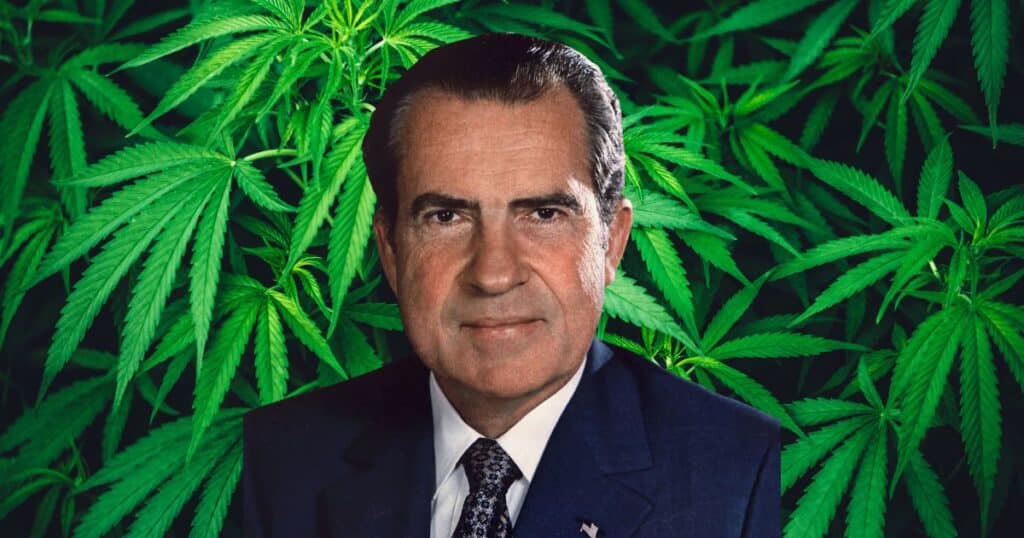The ‘War on Drugs’ has been a controversial topic for decades, burning through billions of dollars and impacting countless lives. But recent revelations about President Nixon, the man who started it all, bring new light to the conversation. What if the war’s fundamental premise was flawed from the beginning? Uncovered recordings reveal that Nixon privately admitted marijuana was “not particularly dangerous,” even as he publicly declared it a menace.
Brief History of Cannabis in the United States
In the 18th and 19th centuries, cannabis was commonly used in the United States for medicinal purposes. American doctors prescribed it for a range of conditions, recognizing its therapeutic benefits.
The landscape began to shift in the early 1900s. A wave of Mexican immigrants brought recreational marijuana use with them, inciting a backlash that led several states to criminalize it. By 1937, Congress passed the Marijuana Tax Act, effectively making recreational cannabis illegal nationwide and stalling research into its medical applications.
Fast forward to 1969, the Supreme Court found the Marijuana Tax Act unconstitutional. In response, President Nixon signed the Controlled Substances Act in 1970, reclassifying drugs based on their perceived danger and medical value. Cannabis was placed in the most restrictive category, Schedule I, alongside heroin and LSD.
Nixon’s War On Marijuana
In 1971, Nixon declared drug abuse the nation’s “public enemy No. 1,” launching an all-out offensive on substance use. The War on Drugs had begun, changing the landscape of drug policy and law enforcement in America.
While the War on Drugs targeted all illicit substance use, Nixon’s specific focus on marijuana is evident from his quoted demand, “I want a goddamn strong statement on marijuana.”
Surprisingly, just two years after this declaration, Nixon made a startling admission during a private meeting with aides. Captured by his secret recording system, Nixon acknowledged that marijuana was “not particularly dangerous.” This revelation came despite his administration’s harsh public stance against the drug.
The recordings remained unnoticed until Kurtis Hanna, a Minnesota cannabis lobbyist, stumbled upon them while poring over hours of tapes. Shocked by the contradiction between Nixon’s words and actions, Hanna shared his findings with The New York Times, bringing this hidden truth to light.
Nixon’s private comments revealed a significant disconnect between his public policies and personal beliefs. He even expressed unease about the harsh punishments for marijuana offenses, calling a 30-year sentence “ridiculous.”
Nixon’s reluctance to change public policy, despite his private views, highlights the political nature of the War on Drugs. He perceived the government as “starting to win” the battle and didn’t want to signal a softer stance, even if it meant perpetuating misleading information.
“Let me tell you, I know nothing about marijuana,” Nixon said at one point. “I know that it’s not particularly dangerous, and most of the kids are for legalizing it. But on the other hand, it’s the wrong signal at this time.”
Long-term Impact of Nixon’s Marijuana Policies
Over the past five decades since the ‘War on Drugs’ began, Nixon’s policies have led to millions of arrests for marijuana-related offenses. These arrests have disproportionately affected minority communities, exacerbating social inequalities.
The classification of cannabis as a Schedule I drug has also stymied scientific research into its potential medical benefits. Despite emerging evidence of its therapeutic value, the legal barriers have hindered rigorous studies.
The financial toll of the War on Drugs has been staggering. The United States has spent over $1 trillion on drug enforcement, with questionable returns on investment. The human cost, however, is immeasurable, impacting countless lives and families.
Changing Landscape of Cannabis Policy In the United States
Since California passed its first medical marijuana program with Prop 215 in 1996, and Colorado and Washington became the first states to legalize recreational cannabis in 2012, the use of cannabis has surged across the nation. Public support for legalization has spread across the United States, making marijuana a multi-billion dollar industry.
As of writing this, Currently, 38 states have established medical cannabis programs, while 24 states offer recreational programs. In just a few months, Florida may become the 25th state to implement a recreational cannabis program, if Amendment 3 is voted in.
The discussion surrounding the federal rescheduling of cannabis has gained significant momentum over the last few years. In 2022, President Biden asked the Attorney General and the Secretary of Health and Human Services (HHS) to initiate a scientific review of marijuana’s classification under federal law.
Following recommendations from both the HHS and the Drug Enforcement Administration (DEA), the proposal to move cannabis from Schedule I to Schedule III has been under serious consideration.
A public comment period revealed overwhelming support, not just for rescheduling cannabis, but for its complete removal from the Controlled Substances Act (CSA). The political backing for these changes has come from notable figures across the spectrum, including Vice President Harris and former President Trump, who have both expressed support for ongoing efforts in rescheduling.
Change Has To Come
The long-term consequences of the War on Drugs have been devastating, with countless lives disrupted and communities fractured.-term consequences have of the War on Drugs has been devastating, with countless lives disrupted and communities fractured. The substantial cost of this failure—both human and economic—has unequivocally defined it as a misguided endeavor. As the government shows signs of re-evaluating cannabis’s classification, there’s hope that some injustices may be rectified.
However, mere rescheduling within the Controlled Substances Act (CSA) is insufficient. Cannabis, now widely accepted for medical use and recreational in nearly half the states, should be completely removed from the CSA. Until then, people continue to serve lengthy sentences like Edwin Rubis for activities deemed legal today, underscoring the urgent need for comprehensive reform.
















